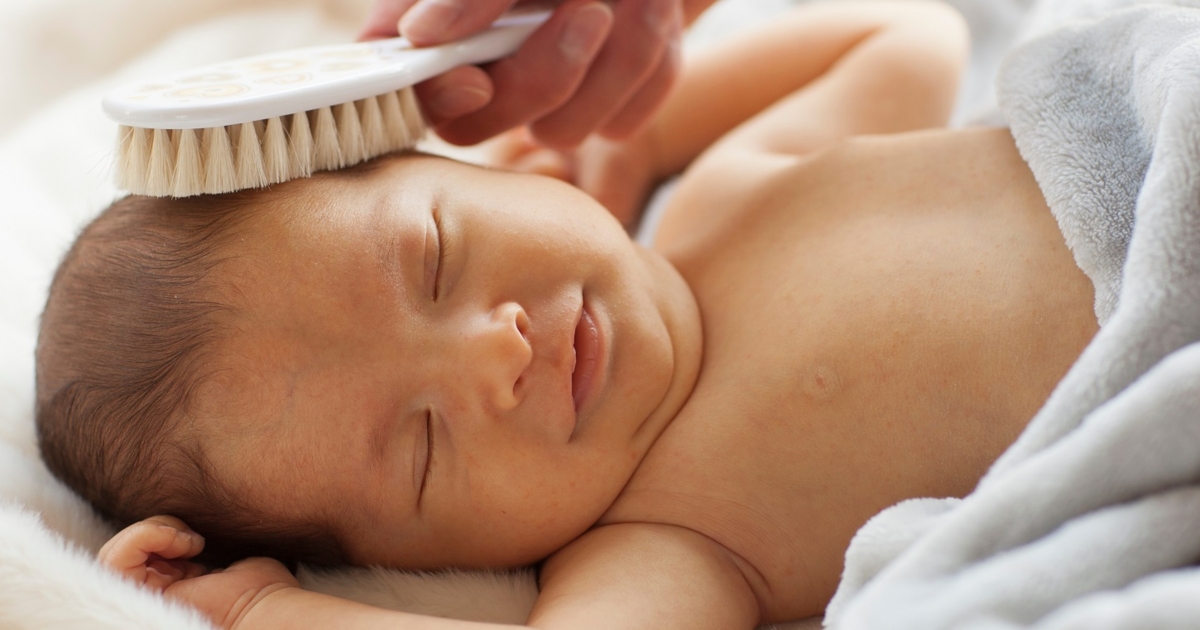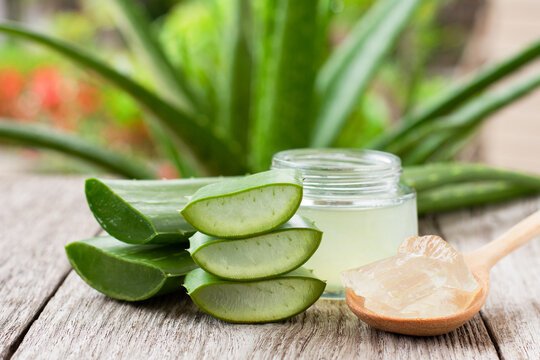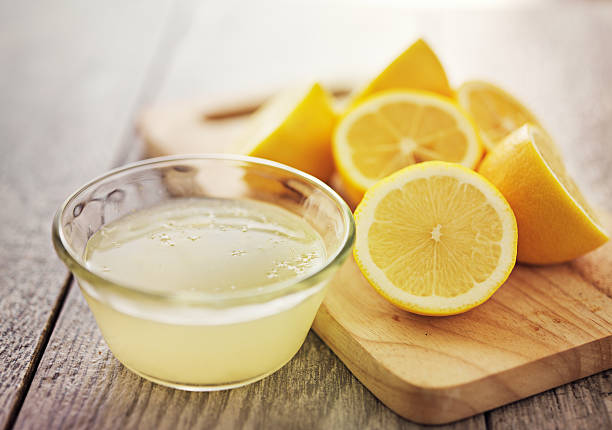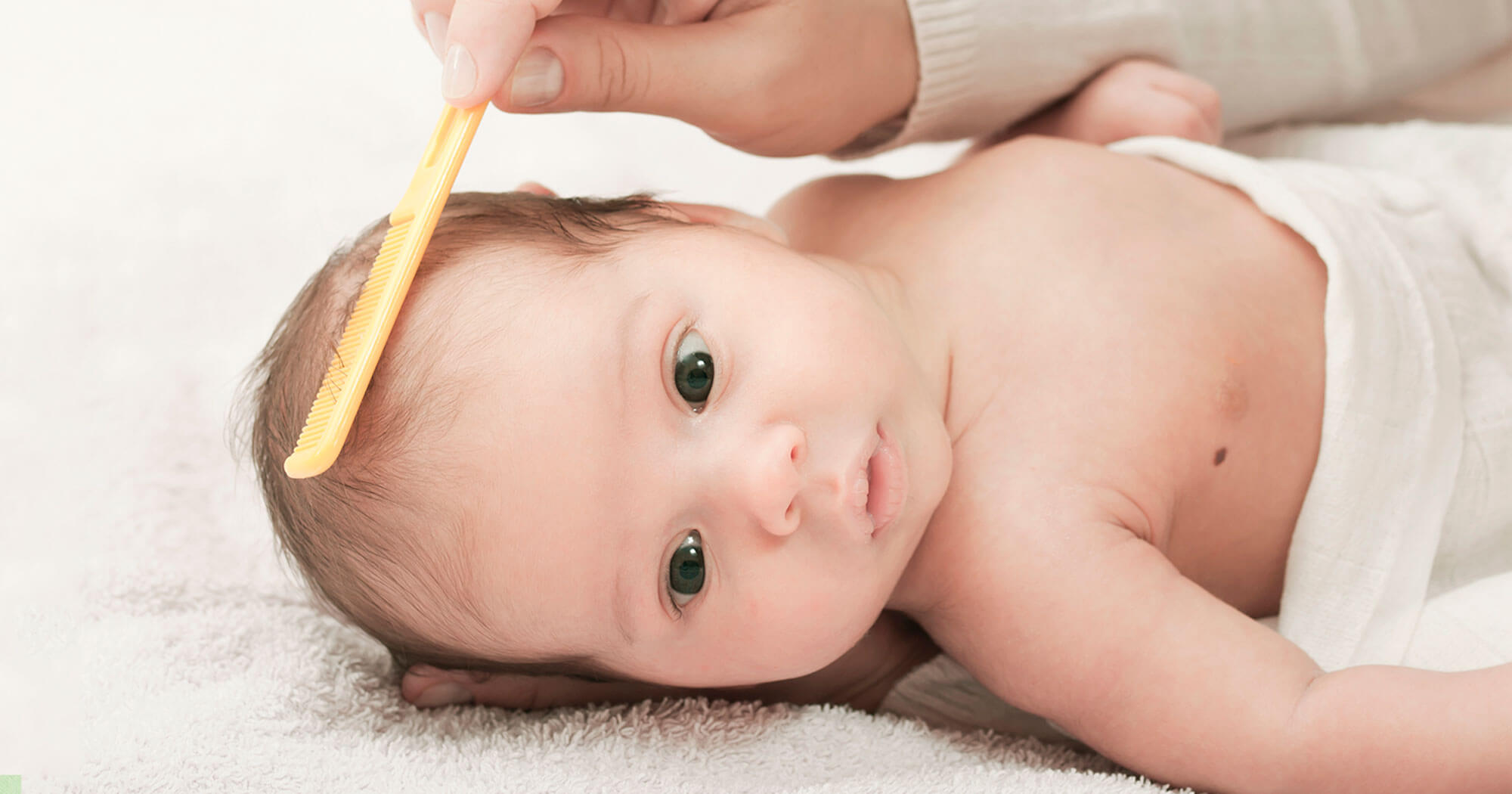Baby dandruff, also known as cradle cap or seborrheic dermatitis, is a common skin condition that affects many infants. It is characterized by flaky, yellowish, or whitish scales on the baby’s scalp. However, there is a great difference between baby dandruff and the kind of dandruff that adults sometimes get. For babies, the condition is called cradle cap. Cradle cap is primarily caused by overactive oil glands in the baby’s scalp, leading to the accumulation of dead skin cells. It is not contagious or indicative of poor hygiene. The symptoms typically include dry, scaly patches on the scalp, which may appear yellowish or brownish. It is harmless and temporary. There are many types of anti-dandruff shampoo available in the market, and you can also use them. But they are not able to remove dandruff completely. There are many natural home remedies to eliminate baby dandruff quickly and permanently:
Gentle scalp massage and brushing

A simple and effective remedy to treat baby dandruff is through gentle scalp massage and brushing. Using a soft-bristled brush or a clean, soft cloth, gently rub the baby’s scalp in a circular motion to loosen the scales. This helps in improving blood circulation and promotes natural oil production, reducing dryness and flakiness.
Short baths
No doubt bath is essential to maintain hygiene, but giving a long bath to your baby can dry out their sensitive and delicate skin, which leads to baby dandruff. Keep the temperature of the water around 98 degrees Fahrenheit and bathe for not more than 10 minutes. Moreover, if you bathe your baby three or four times each week (means every alternate day) also won’t lead to any hygiene issues.
Oatmeal treatment
Oatmeal is a soothing ingredient that can help alleviate baby dandruff. Prepare a natural oatmeal paste by grinding plain oatmeal into a fine powder and mixing it with water to form a paste. Apply this paste to the affected scalp and leave it on for about 15 minutes before rinsing off. Oatmeal has natural exfoliating properties that can gently remove the flakes and restore the scalp’s natural balance.
Tea tree oil
Tea tree oil is renowned for its antifungal and antibacterial properties, making it an excellent natural remedy for baby dandruff. Mix a few drops of tea tree oil with carrier oil, such as coconut oil or almond oil, and apply it to the baby’s scalp. Leave it on for a few hours or overnight before gently rinsing it off with a mild baby shampoo. It is essential to dilute tea tree oil properly, as it can be too strong for a baby’s delicate skin.
Aloe Vera gel

Aloe Vera gel is a gentle and soothing remedy that treats baby dandruff effectively. Extract fresh aloe vera gel from an aloe leaf and apply it directly to the affected areas of the scalp. Leave it on for about 15 minutes before washing it with lukewarm water.
Apple cider vinegar
Apple cider vinegar is known for its natural acidity, which helps restore the scalp’s pH balance and inhibit the growth of yeast or fungi that can contribute to dandruff. Mix equal parts of apple cider vinegar and water and use this solution as a final rinse after shampooing the baby’s hair. Take care to avoid getting the solution into the baby’s eyes.
Breast milk
Breast milk is not only a complete source of nutrition for babies but also contains antibodies and antimicrobial properties that can help treat baby dandruff. Apply a few drops of breast milk to the affected areas of the scalp and gently massage it in. After a few minutes, rinse off with lukewarm water.
Lemon juice

Take fresh lemon juice and apply it directly on the child’s scalp. The citric acid present in lemon plays a huge role in effectively removing dandruff produced on the layers of the skin.
Neem leaves
Neem is widely known for its antiseptic, anti-inflammatory, and immune-boosting properties, which are efficacious against various skin diseases, septic sores, and infected burns. Boil 1 handful of neem leaves with 4 cups of water, then after this solution cools down, wash the hair with it. Follow this method at least 3 times a week.
Fenugreek
Dandruff is easily removed with the help of fenugreek. Soak 2 teaspoons of fenugreek seeds in water overnight, then grind it in the morning, then add 2 teaspoons of apple cider vinegar to it and apply it on your child’s scalp for 20-30 minutes, then wash it with shampoo. If apple cider vinegar is unavailable, lemon can also be used.
Read this Next: Best Skin Care Tips For Toddlers
Curd and black pepper
Curd and black pepper can be used to treat dandruff. Curd has antibacterial properties, which protect us from infection caused by bacteria or fungus in the head. Black pepper has antifungal properties. Mix well-ground black pepper in a cup of curd. Apply this mixture to the child’s head. Keep in mind that use this mixture only on the head and not on the hair at all. After an hour, wash the hair thoroughly and shampoo.
Basil leaves
Basil leaves have antibacterial, antifungal, and antiseptic properties, with the help of which it is known to remove dandruff. Mix one teaspoon of amla powder with the pulp of basil leaves. Use this paste on the child’s head and leave it for an hour before washing hair.
Conclusion
Dealing with baby dandruff can be worrisome for parents, but several effective natural home remedies can help alleviate the condition. It is crucial to remember that baby dandruff is a common occurrence and usually resolves on its own with time. However, if dandruff persists, becomes severe, or is accompanied by other symptoms, it is advisable to consult a pediatrician for a proper diagnosis and appropriate treatment.
Disclaimer: The information provided in this article is for informational purposes only and should not be considered medical advice. Please consult a healthcare professional before using any remedies or treatments mentioned above, especially if your baby has any underlying health conditions.
















